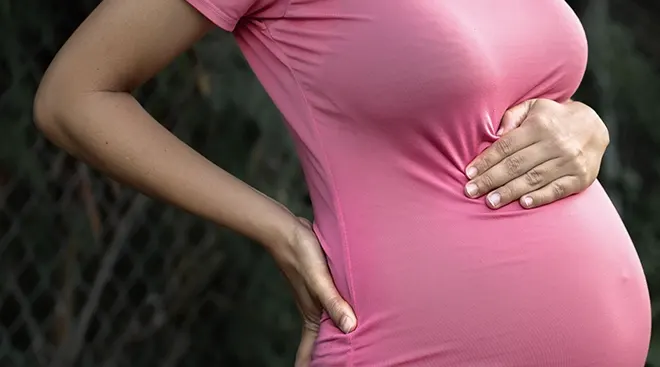What to Do About Shortness of Breath During Pregnancy
Huffing and puffing aftering walking down the hall or having a simple conversation? It’s normal to feel out of breath at certain points during pregnancy—especially toward the end of the journey when baby is quite literally taking up all your air space. Still, if you’re dealing with regular and frequent bouts of breathing troubles in pregnancy, you’ll want to understand what’s considered status quo (and what’s not). Read on to learn what you need to know about experiencing shortness of breath during pregnancy, including when to reach out to your doctor.
If you’re experiencing shortness of breath in pregnancy, don’t panic: It’s common to feel winded. “It’s very normal and expected,” says Meleen Chuang, MD, an ob-gyn and clinical associate professor at NYU Langone. In fact, research suggests that up to 70 percent of pregnant people may experience shortness of breath—aka dyspnea—during those trying nine-plus months.
Experts say that shortness of breath is unlikely to be an early sign of pregnancy. “Rarely would this be the first sign that someone noted they were pregnant,” says Matthew Carroll, MD, assistant professor of obstetrics and gynecology at Baylor College of Medicine. But he also points out that he’s seen this happen before: “I do recall one patient whose asthma used to worsen during pregnancy and that was her first clue.”
Every person and every pregnancy is different, and shortness in breath can come on at varying times across the board, says Carroll. That said, he adds that it can occur as early as the first trimester.
That said, for most pregnant people, shortness of breath happens later on in the journey. “It usually starts in the third trimester, when the baby is growing pretty fast and pushing the lung up more into the chest cavity,” Chuang adds.
There are a few different things that can lead to shortness of breath during pregnancy. “Earlier in pregnancy, it’s likely related to hormonal changes, specifically an increase in progesterone,” says Julie Lamppa, APRN, a certified nurse midwife at Mayo Clinic in Rochester, Minnesota.
But as your pregnancy progresses, the size of baby can also impact your breathing. The baby—and your uterus—can push up against your diaphragm (a major muscle that helps you breathe), making it harder to breathe normally, Chuang explains.
Being pregnant also means your oxygen needs are higher than usual, Carroll says. “Pregnant people naturally breathe more times per minute, and if they don’t meet that demand or exert themselves [they] can feel short of breath,” he adds.
If you’re experiencing sudden shortness of breath in pregnancy and this is a new thing for you, Lamppa says you should contact your healthcare provider. But Lamppa says there are a few things you can do to get relief if you feel like you’re generally more winded than usual:
- Slow your pace. Moving a little slower than usual during pregnancy can help your body catch up with what you’re doing, making it easier to breathe more comfortably.
- Rest. If you’re out of breath while doing something, like climbing a large set of stairs, take a moment to rest.
- Stand up straight. It’s a simple hack, but standing or sitting up straight gives your lungs more room to expand when you breathe.
- Prop yourself up when you sleep. Putting pillows under your upper body when you sleep can help ease the pressure your uterus puts on your lungs.
While shortness of breath is common in pregnancy, it can be a sign of a more serious health issue, including:
- Pulmonary embolism. These are blood clots that can form in the lung. “It’s a life-threatening emergency,” Chuang says. “It can also present after you have the baby, up to eight to 12 weeks.”
- Preeclampsia. This condition, which is high blood pressure during pregnancy, can cause fluid to build up in the lungs, leading to trouble breathing, Chuang says.
- Asthma. Asthma can be exacerbated in pregnancy, Chuang says—and that can lead to shortness of breath.
- Anemia. This condition, which develops when your blood produces a lower-than-normal amount of healthy red blood cells, “can [reduce] the amount of oxygen transported to body tissue, causing shortness of breath,” Chuang says.
- Cardiac conditions. While rare, heart conditions like cardiomyopathy and heart failure can lead to shortness of breath, Lamppa says.
“Any shortness of breath that doesn’t resolve on its own, interferes with normal activities of daily living or is associated with other symptoms such as chest pain, lightheadedness or palpitations should be reported to your physician,” Carroll says. But even if it doesn’t seem to be severe, Chuang says it’s also a good idea to at least mention your shortness of breath to your healthcare provider at your next checkup. It’s very likely nothing major, but it never hurts to play it safe.
Lamppa says it may get a little better in the third trimester. However, experts say that out-of-breath feeling generally gets better after baby is born. “For most patients, it stabilizes in the third trimester and resolves pretty quickly after delivery,” Carroll says.
If you’re having shortness of breath during your pregnancy and it bothers you, talk to your doctor. While it’s a common experience, your provider will likely want to evaluate you to make sure there isn’t an underlying health issue. And they should be able to offer up personalized tips to help you feel more comfortable.
Please note: The Bump and the materials and information it contains are not intended to, and do not constitute, medical or other health advice or diagnosis and should not be used as such. You should always consult with a qualified physician or health professional about your specific circumstances.
Plus, more from The Bump:
Matthew Carroll, MD, is an assistant professor of obstetrics and gynecology at Baylor College of Medicine. He earned his medical degree from the Mount Sinai School of Medicine.
Meleen Chuang, MD, is an ob-gyn and clinical associate professor at NYU Langone. She earned her medical degree from SUNY Stony Brook.
Julie Lamppa, APRN, is a certified nurse midwife at Mayo Clinic in Rochester, Minnesota, and the author of Obstetricks: Mayo Clinic tips and tricks for pregnancy, birth and more.
American Journal of Case Reports, Dyspnea in Pregnancy: A Case Report of a Third Trimester Mediastinal Mass in Pregnancy, Dec. 2018
Learn how we ensure the accuracy of our content through our editorial and medical review process.
Navigate forward to interact with the calendar and select a date. Press the question mark key to get the keyboard shortcuts for changing dates.
Advertisement
Advertisement
Advertisement
Advertisement




















































